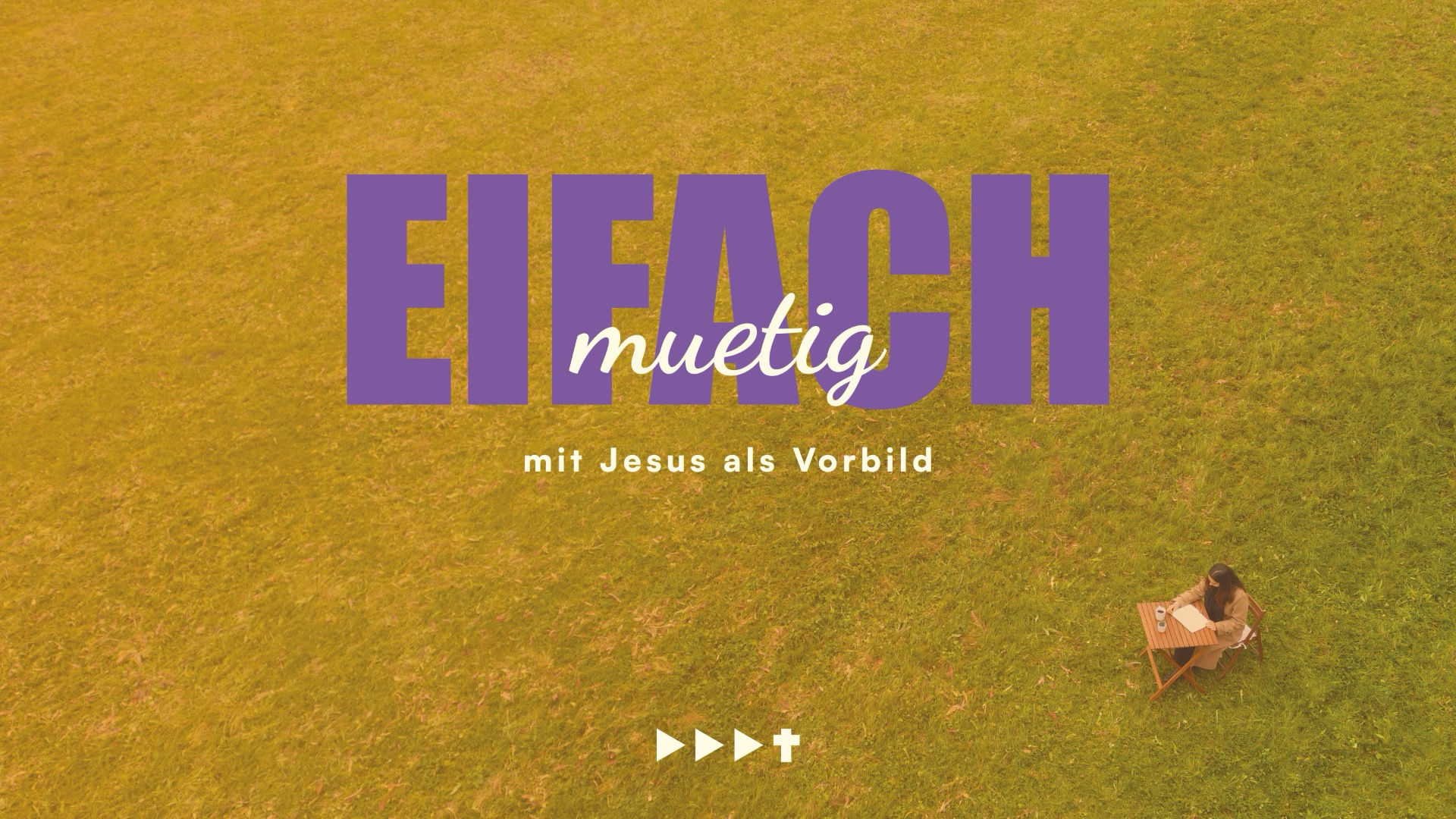The path to life
Series: EIFACH muetig – with Jesus as a role model | Bible text: Psalm 32; Galatians 5:17–25
Life in abundance comes from Jesus Christ. Sin separates us from God. Here we must come true and confess our guilt and claim Christ’s forgiveness. Then his grace, his favour, is applied to us without preconditions and we find real life. In practical terms, this happens through the Holy Spirit, who advises and equips us in a «training programme» in all everyday matters.
The way to life is through Jesus Christ. «I have come that they may have life and have it to the full» (John 10:10; LUT). «Jesus says to her: I am the resurrection and the life. Whoever believes in me will live, even if he dies» (John 11:25 LUT).
Life in abundance – not mere existence. Life as it was once meant to be – that is what Christ promises us in his discipleship. How do we gain access to this life? Here too, Jesus shows us the way via two steps: Truth and grace. We need both. «He, who is the Word, became man and lived among us. He was full of grace and truth and we became witnesses of his glory […]» (John 1:14 NLB).
Part 1: What is the truth?
The world created by God was orientated towards harmony and love. Then man came along and wanted to be happy without God. The result was death, sadness, misery and illness. In a harmonious system, even the slightest irritation is enough to disrupt the system. Selfishness always disrupts – or destroys – it is always at the expense of someone else. The effect of misbehaviour is guilt – the responsibility for the negative consequences of our actions. Those who are guilty are not free.
In financial terms, it is relatively easy to settle a debt by repaying the amount owed. In other respects, it is difficult or even impossible to settle debts. A large part of our debt is irreversible – it cannot be cancelled. Every one of us is a sinner and has therefore incurred debt.
This is the truththat Christ demonstrated through his life in this world. He showed this by addressing misbehaviour, but he showed it most clearly by taking all the guilt of the world upon himself. The necessity of a substitutionary human sacrifice showed the extent of our guilt. Being guilty means having to die. What does this have to do with life?
This truth has to do with our lives in two ways:
- Basically, anyone who is without forgiveness remains separated from God and thus from the life that comes from him.
- But even when we are reconciled with God, we repeatedly resort to sinful behaviour, we do not fully trust in God, we do selfish things. These things also separate us from life in everyday life – from the fullness and joy of Christ.
We live in a time that no longer likes to talk about sin and guilt – although it affects us all – even as those reconciled with God. If we ignore sin and guilt, we do not lose our reconciliation as the redeemed, but our relationship with God cools down and life disappears from our everyday lives.
What are mechanisms for dealing with guilt in the wrong way?
- Self-righteousness
- Legality
- Depression
- Cheap apology
- Denial
- Scalelessness
- …
How did the biblical David deal with the issue? «Blessed is he whose transgressions are forgiven, whose sin is covered!Blessed is the man to whom the LORD does not impute guilt, in whose spirit there is no deceit!For when I tried to conceal it, my bones languished because of my daily mourning.For your hand was heavy on me day and night, so that my sap dried up as it withers in summer. Therefore I confessed my sin to you and did not hide my guilt. I said: I will confess my transgressions to the LORD. Then you forgave me the guilt of my sin» (Psalm 32:1–5 LUT).
He recognises that guilt robs life. Forgiveness, on the other hand, opens the door to life from God. David also confesses this in the same psalm: «Rejoice in the Lord and be glad, you righteous, and shout for joy, all you devout» (Psalm 32:11 LUT). The first step towards life is to relentlessly expose your own inability. But that is not yet life…
Part 2: How does the grace of Christ come to us?
Grace is a mystery that we cannot grasp. It is a favour in which we only receive good things because the giver wants it – one-sidedly. The crazy thing is that grace would be there for everyone. The only condition for grace to reach us is that we engage with the giver and want to live with him. Everyone wants the good gifts, but not the giver…
An example: there was a beggar on one side. Penniless and completely filthy. On the other side was a king in a magnificent palace. The king saw the beggar and wanted to take him in – even make him a prince. There was only one condition. You have to agree to become a prince. This begins with cleaning yourself and putting on new clothes.
Christ has paid the price for our mistakes. The price for our debts is a human life – death. Christ himself paid this price with his life. Through his blood we are cleansed of our «filth». If we claim this personally. Why? Because God and his Son love us. Because we are so great? No, because they have decided to do so.
Part 3: How does life come to us?
How a former beggar learns to be a prince. Even after an initial cleansing and putting on new clothes, this is a two-way process: Learn to do the good, learn to leave the bad behind. In this process is every person who has given their life to God and who has accepted Christ as their Lord. We are in the prince and princess training programme. Who is our teacher? The Holy Spirit. «It is the Spirit who gives life; the flesh is of no use. The words that I have spoken to you are spirit and are life» (John 6:63 LUT).
How does the Spirit bring life to everyday life? He works on and in us every day on behalf of Jesus Christ. «The old, sinful nature loves to do evil – exactly the opposite of what the Holy Spirit wants. The Spirit awakens desires in us that contradict the inclinations of our sinful nature. These two forces are in constant conflict with each other so that you cannot do what you want. But if you are led by the Holy Spirit, you are not subject to the law.If you follow the inclinations of your sinful nature, your life will show the corresponding consequences: Fornication, impure thoughts, pleasure-seeking, idolatry, sorcery, enmities, strife, jealousy, anger, selfish ambition, divisions, self-righteous separation from other groups, envy, drunkenness, dissolute lifestyles and the like. I repeat what I have already said, that no one who leads such a life will inherit the kingdom of God.If, on the other hand, the Holy Spirit controls our lives, he will cause completely different fruit to grow in usLove, joy, peace, patience, kindness, goodness, faithfulness, gentleness and self-control. None of this contradicts the law.Those who belong to Christ Jesus have nailed the passions and desires of their sinful nature to his cross.If we now live by the Holy Spirit, then we should also let him rule all areas of our lives» (Galatians 5:17–25 NLB).
Important: We only have to make the right decisions, the fruit grows in us through the Spirit. More on this next Sunday. We make many decisions every day. With every decision, we choose between what we have recognised as God’s will and self-realisation (wanting to be happy over selfishness). The letter to the Galatians promises us that the Spirit actively speaks to us – as children of God. This happens in many ways, but in such a way that we know it (if we listen to it).
It can happen that we don’t know which way to go. Here, too, God gives us the answer: «But if any of you lacks wisdom, let him ask God, who gives to everyone gladly and without reproach, and it will be given to him» (James 1:5 LUT).
Summary
If we lack joy and peace, we must first become honest with ourselves, like David. Put off what is wrong. God then always offers us purification in Christ. Then we can take up our destiny again: To learn to live as princes and princesses of the King. A prince learns most in the proximity of the King, who sets him an example, and through his personal teacher – in our case, the Holy Spirit. If we live in this close relationship with king and teacher in our everyday lives, we gain wisdom about what to do and, by following the instructions, freedom for good and thus access to life, which Christ in turn gives us through his Spirit.
Possible questions for the small group
Bible text: Psalm 32:1–5; Galatians 5:17–25
- Do you have life in abundance – and if not, what are you specifically lacking?
- How honest are you in dealing with your own misbehaviour? Do you regularly confess your mistakes to God?
- Have you understood «grace» – this unconditional favour of God? How do you make use of it in your everyday life?
- How do you experience the Holy Spirit speaking to you in everyday life and giving you advice for decisions? How do you experience the struggle between self-realisation and listening to the Spirit?
- How do you experience that you find access to real life by listening to God?



